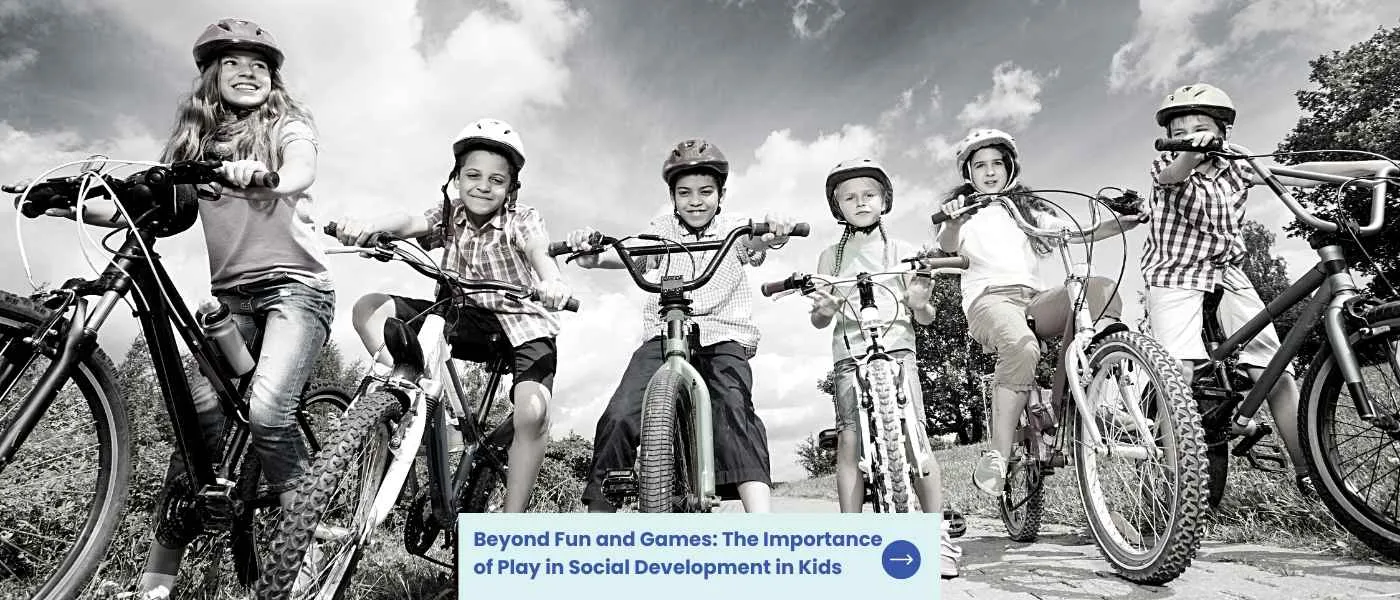As a parent, you probably already know that playtime is important for your child’s growth and development. Play allows children to explore their world, develop their imaginations, and have fun. But did you know that play also plays a critical role in fostering social development in kids? In fact, research has shown that play is essential for helping children develop social skills, such as communication, cooperation, and empathy.
In this article, we’ll take a closer look at the importance of play for children’s social development in children and explore some ways you can encourage your child to play in ways that promote healthy social growth. Whether you’re a parent, caregiver, or educator, understanding the role of play in social development can help you support the children in your care as they grow and learn.
Key Takeaways on Children’s Play
- Social development is a crucial aspect of a child’s life and development. As children learn and acquire social skills, they become better equipped to navigate their social environment, form positive relationships with others, and develop a sense of self-awareness and empathy towards others.
- Social play is essential for children’s development. By engaging in different types of play, children can develop a range of social skills that will help them form positive relationships and succeed in the world around them.
- Toys can be powerful tools for supporting development in children. By providing children with toys that encourage communication, cooperation, and empathy, parents and caregivers can help kids develop important social skills that will serve them well throughout their lives.
What Is Social Development in Children?
Social development in children refers to the process of learning and acquiring social skills and abilities to interact with others effectively. This development involves acquiring the necessary skills and abilities to form and maintain positive relationships with others, as well as developing a sense of self-awareness and empathy towards others.
During early childhood, social-emotional development is an essential aspect of a child’s growth and development. Infants begin to learn about social interactions through their interactions with caregivers, siblings, and other family members.
As children grow older, they become more interested in exploring and interacting with their environment and other people around them. They start to develop skills such as sharing, taking turns, and showing concern for others.
As children continue to develop, they begin to acquire more complex social skills, such as conflict resolution, negotiation skills, and effective communication. These skills are essential for emotional development and for building and maintaining positive relationships with others. Children who lack these skills may struggle with making friends or may have difficulty interacting with others in a positive manner.
Additionally, as children watch others play they develop emotional regulation and empathy. Emotional regulation refers to the ability to manage and express emotions in an appropriate manner, while empathy refers to the ability to understand and respond to the emotions of others. Both emotional regulation and empathy are critical for healthy social development and positive social interactions.

Why Is Social Development Important During Early Childhood Education?
Social development plays a critical role in early learning and education as it helps young children to establish essential skills and attitudes that are important for their overall growth and success.
Early education is a period of rapid development and learning, and social skill development is one of the key areas that parents and educators need to focus on to ensure that kids develop the necessary skills to interact with others effectively.
One of the primary reasons why social growth is important during early education is that it helps young children to establish healthy relationships with their peers and adults. By interacting with others, preschool children spend time with others and learn how to communicate their thoughts and feelings, express empathy, and develop emotional intelligence. These skills are essential for developing positive relationships and are critical for success in later life.
Another critical aspect of social growth during early education is the development of social skills. As children play with others, they learn how to share, take turns, and work cooperatively with others.
These skills not only help children to get along with their peers, but they are also important for success in school and later in life. Children who have strong skills are more likely to succeed academically and professionally.
Social growth during early education also plays a vital role in developing children’s self-esteem and self-confidence. Children playing with others begin to develop a sense of identity and self-awareness. By receiving positive feedback from their peers and adults, children begin to learn to appreciate their strengths and weaknesses, which helps to build their self-esteem and confidence.
Social growth during early childhood education helps children to develop essential life skills. These skills include decision-making, and conflict resolution. By learning how to resolve conflicts and make decisions, kids develop the necessary skills to navigate the complexities of the world around them and can contribute to their school readiness.
Understanding the benefits of play helps parents come up with activities that boost children’s learning and development.
What Are the Types of Play That Support Social Development?
Play is a fundamental part of a child’s development, as it provides opportunities to learn and practice new skills. Social play is especially important for developing social skills such as communication, cooperation, and empathy. There are several types of play that support social growth and development:
- Pretend play involves using imagination to create scenarios and roles. This type of play helps kids develop skills by encouraging them to take on different roles, communicate their ideas, and cooperate with others.
- Cooperative play involves working together towards a common goal. This type of play helps kids develop skills by teaching them to take turns, share, and communicate effectively with others.
- Board games are a great way to develop skills such as taking turns, following rules, and winning or losing gracefully. Board games also encourage communication and cooperation between players.
- Outdoor play provides opportunities for children to interact with each other, cooperate, and solve problems together. Activities like playing ball, building sandcastles, or exploring nature can help kids develop skills.
- Creative play teaches children to use their creative minds. This play involves activities such as drawing, painting, or crafting. This type of play helps kids develop skills by encouraging them to share their ideas, work collaboratively on projects, and give and receive feedback.
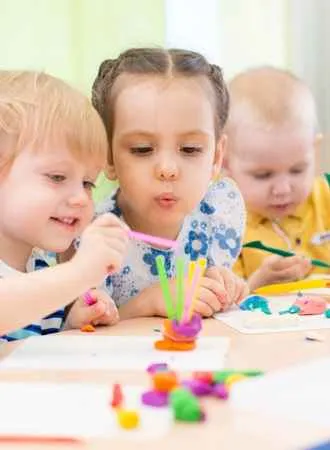
What Kinds of Toys Support Social Development?
Toys play an essential role in a child’s development, as they help them learn and grow in different ways. When it comes to social skill development, certain toys can encourage kids to develop skills such as communication, cooperation, and empathy.
Here are some examples of toys that can support social growth and development:
- Board games are an excellent way for children to learn how to take turns, follow rules, and cooperate with others. Games such as Candy Land, Chutes and Ladders, and Sorry! are great options for younger children, while games like Monopoly and Clue can be more challenging and engaging for older children.
- Puzzles require children to work together to solve a problem, which can help them develop communication and teamwork skills. Jigsaw puzzles, in particular, can help children learn how to share ideas and work collaboratively to complete a task.
- Dolls and stuffed animals can help children develop empathy and emotional intelligence by encouraging them to care for and nurture their toys. Children can practice taking care of their dolls and stuffed animals, which can help them learn how to be responsible and empathetic towards others.
- Pretend play toys such as dress-up costumes, play kitchens, and tool sets can help children develop their imagination and skills. Children can practice taking on different roles and acting out different scenarios, which can help them learn how to communicate and cooperate with others.
- Building toys such as blocks, Legos, and K’NEX can help children develop spatial awareness, problem-solving skills, and cooperation. Children can work together to build structures and solve problems, which can help them learn how to communicate and work together effectively.
How to Encourage Social Development Through Play
Parents can incorporate play which can encourage social development, which is essential for children as it helps them develop skills, communication, emotional regulation and for building strong parent-child bonds.
Here are some effective ways to encourage development through play:
- Encourage cooperative play. Encourage children to play together, share toys, and take turns. Cooperative play helps children develop skills such as communication, teamwork, and problem-solving.
- Role-playing helps children develop empathy and understanding of others’ feelings. It also helps them learn to communicate effectively, negotiate, and resolve conflicts.
- Create opportunities for social interaction. Provide children with opportunities to interact with others, such as playdates, group activities, and team sports. These activities help children learn how to interact with others and form positive relationships.
- Model positive behavior. Children learn from the behavior of the adults around them, so it’s essential to model positive social behaviors such as sharing, taking turns, and being kind to others.
- Limit your children’s screen time and encourage more physical activity through play-based learning, which has significant gross motor development and physical benefits.
- Play games that encourage skills. Board games, card games, and other games that require cooperation and communication can be great for developing skills. They teach children how to take turns, work together, and resolve conflicts.
- Encourage fantasy play. This kind of play allows children to explore different roles and perspectives, which helps them develop empathy and understanding of others. As child plays with house items and objects, they also engage in symbolic play.
- Provide opportunities for free play. Free play allows children to develop their skills independently. By allowing them to play without interference or adult guidance, they learn how to negotiate and resolve conflicts on their own.
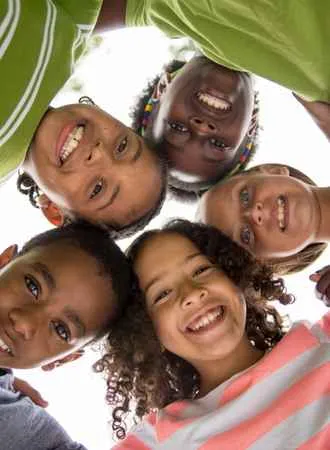
What Are the Challenges of Promoting Social Development Through Play
Play is an important aspect of childhood development, and it plays a significant role in promoting social skills. However, promoting development through play can be challenging. Below are some of the main challenges of promoting development through play:
- Play is most effective when children have access to play spaces where they can interact with other children. However, in many communities, access to safe and appropriate play spaces is limited, and this can limit opportunities for development through play.
- Many children have limited time for play due to the demands of school and other activities. This limited time can make it difficult for children to engage in the kind of unstructured play that is most effective for development.
- Not all children have compatible play styles, and finding playmates who are compatible can be challenging. This can limit opportunities for development through play.
- Children often have preconceived ideas about gender and cultural stereotypes, which can impact their play experiences. For example, boys may be less likely to engage in imaginative play or role-playing games, which can limit their opportunities for development through play.
- Safety concerns, such as bullying, can also limit opportunities for development through play. Children who are bullied or feel unsafe on the playground may be hesitant to engage in play with their peers.
- Children need adult supervision to ensure that they are engaging in safe and appropriate play. However, in many cases, adult supervision may be limited or nonexistent, which can impact the effectiveness of play in promoting development.
- Providing access to play materials and toys can be expensive, and not all families or communities have the resources to provide these materials. Limited resources can limit opportunities for development through play.
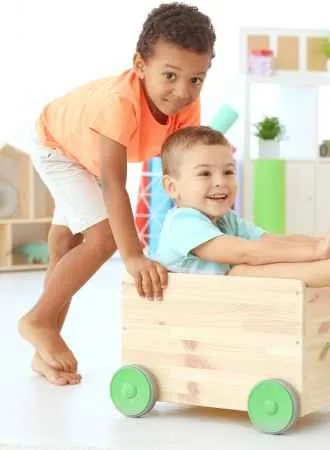
FAQs on How Play Supports Child Development
Does pretend play promote child development?
Yes, young children’s pretend play are good for promoting healthy child development.
- Dramatic play helps children improve creative thinking by allowing them to engage in activities that are not bound by reality.
- Independent play allows children to practice and develop social skills such as sharing, turn-taking, and communication.
- Pretend play encourages children to engage in playful learning, which is good for their social competence, fine motor skills, physical health and overall mental health.
- Pretend play helps kids develop emotional regulation skills as they explore different emotions and roles.
- Pretend play can promote cognitive skills and language development by encouraging children to use and understand new words and concepts.

How does free play support child’s development?
Free play is essential for a child’s overall development as it allows them to explore and experiment with their environment at their own pace. Through free play, children can develop their imagination, creativity, and problem-solving skills.
When children play freely, it also helps them to build communication skills and learn how to navigate relationships with peers. Free play allows children to take risks and make mistakes, which can lead to valuable learning experiences. Overall, free play is critical for a child’s physical, emotional, and cognitive growth and should be encouraged as much as possible.
What is rough and tumble play?
Rough and tumble play is a type of physical play that is characterized by physical contact, such as wrestling, tickling, chasing, and play-fighting. This type of play is common among young children and is believed to contribute to the child’s emotional development. It also helps develop social and physical skills, such as gross motor skills, self-regulation, empathy, and coordination. Although it involves physical contact, rough and tumble play is typically non-aggressive and is seen as a positive form of play.
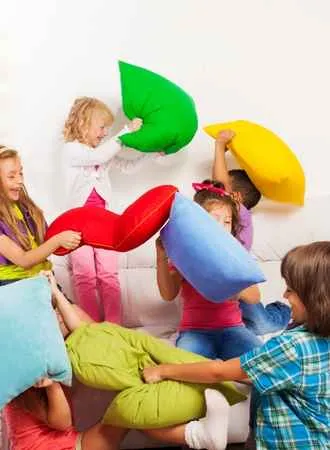
What is solitary play?
Solitary play is a type of play in which a child engages in independent play without interacting with other children. During solitary play, children may engage in activities such as playing with toys, coloring, or reading, and they may prefer to be alone or in their own space. This type of play is common among young children and is believed to contribute to the development of imagination, creativity, and self-esteem.
What is parallel play?
Parallel play is a type of play in which children engage in independent play alongside each other without directly interacting or communicating with each other. During parallel play, children may play with similar toys or engage in similar activities, but they may not engage in joint play or conversation. This type of play is common among young children, particularly toddlers, and is believed to be a normal part of their social growth and development as well as children’s cognitive development. As children grow and develop social skills, they may transition from parallel play to more interactive forms of play.

